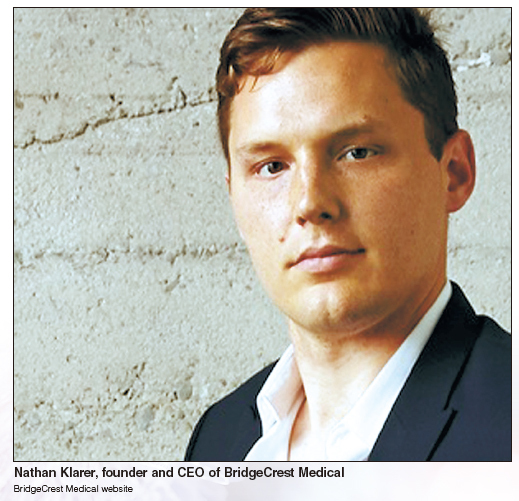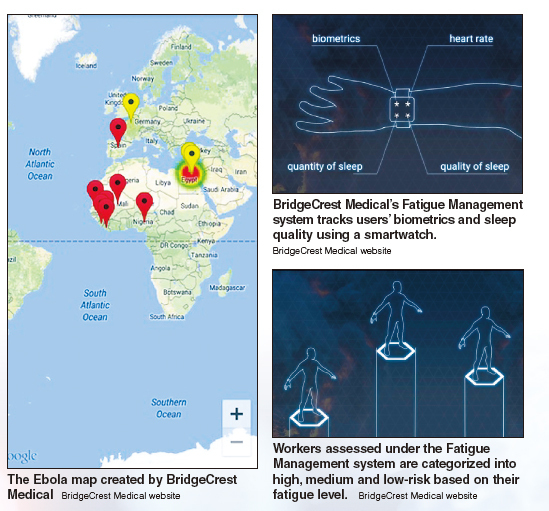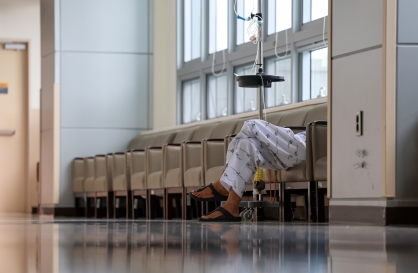[SUPER RICH] BridgeCrest Medical helps fight disease with big data
As contagious diseases such as Ebola and MERS arise, the more important big data solutions such as Klarer’s Ebola map have become.
By Korea HeraldPublished : June 16, 2015 - 20:17
Amid the Middle East respiratory syndrome outbreak, a Korean technology company won much public support by creating and distributing a “MERS map” before the government did.
Nathan Klarer, founder and CEO of start-up BridgeCrest Medical, did something similar last year by presenting an Ebola map when the United States was facing an Ebola scare.
Ebola, which had been spreading in West Africa, led to a scare in the United States when a patient in Texas died from it and two nurses who were treating him were also infected.

The situation became an opportunity for BridgeCrest Medical as they used big data to present an “Ebola map” that marked Ebola patients across the world, garnering attention from the health care industry.
The company created the Ebola map in partnership with a private medical company. The medical staff collected blood and mucus samples from suspected patients and determined whether they had the disease using Ebola screening devices, before uploading the results onto a smartphone or tablet.
BridgeCrest then marked the data results on the map, which included the date, time and location of a patient. People using the map could find out the propensity of an Ebola outbreak in real time. The more samples there were, the higher its accuracy became.
Klarer said that people no longer had to rely on reports from public health authorities, which may take a few days to update information, and that the map allowed people to assess information on their own.
The information was also sent to medical centers, schools and workplaces in order to prevent further spreading of the disease.
The Ebola map attracted much interest in the company. In December, business technology news site Information Week featured BridgeCrest Medical as one of the companies in their article, “9 Healthcare Tech Startups to Watch.”
Nathan Klarer is a graduate of Jacobs School of Engineering, where he majored in bioengineering. He has said in interviews that he is proud of his major, and that he thought one of the areas where the Silicon Valley could apply its technology was health care.
Klarer studied data while working on research as an intern at an investment consulting company and as a health care company intern also took part in developing a medical tool that determined the HIV virus activity in patients in Mozambique.
Using his experiences, Klarer set up BridgeCrest Medical in 2013 at the age of 22 to be a start-up that combined health care and technology.
Klarer’s business goal is to use data analysis to raise the health standards of individuals and organizations.
Another feature using data analysis that BridgeCrest Medical boasts is its health and safety management service for workers, especially those who are working in high-risk industrial environments such as mines.
Usually, industrial companies provide prior education and safety gadgets to workers, but that alone cannot completely prevent workplace accidents. Klarer noted the fact that most accidents in industrial settings happen due to workers’ fatigue, and stated the need for accurate information about workers by the hour.
BridgeCrest Medical’s Fatigue Management system, created in tandem with industry experts, uses a smartwatch to assess a worker’s amount and quality of sleep, as well as an individual’s biometrics and heart rate.
The information is automatically sent to BridgeCrest’s data analysis platform, and their conditions are categorized as high, medium or low risk based on preexisting data.

Employers can check their employees’ level of fatigue and exclude a high-risk worker from dangerous sites to prevent accidents. High-risk employees also receive additional testing and appropriate medical attention.
As contagious diseases such as Ebola and MERS arise, the more important big data solutions such as Klarer’s Ebola map become, especially for developing countries that may lack proper infrastructure in tracking down diseases.
“We realized this was a good opportunity to offer an enterprise quality infectious disease analytics solution to a broad audience of organizations in need,” Klarer stated in an interview with Information Week, also stating that he would continue collaborating with other companies to provide better solutions.
In December 2014, BridgeCrest partnered with medical diagnostic manufacturer JAJ International to bring a rapid one-step mobile testing solution to fight Ebola.
The mobile testing solution looks for the presence of Ebola antibodies and antigens, and can determine whether the patient has been infected or not within 10 minutes. Initial testing of patients in Sierra Leone and West Africa has shown an accuracy of 82 percent.
Klarer stated that his goal this year was to expand his fatigue management solutions to more industries, stating that data analysis systems such as those offered by BridgeCrest would become more important on industrial sites in the near future.
By The Korea Herald Superrich Team (sangyj@heraldcorp.com)
Kwon Nam-keun, Hong Seung-wan, Sung Yeon-jin, Bae Ji-sook, Yoon Hyun-jong, Min Sang-seek, Kim Hyun-il, Sang Youn-joo
[한국어 기사]
내일은 슈퍼리치!-빅데이터 분석통해 에볼라 추적…선제적 방역가능케 한 신예 사업가
Nathan Klarer, founder and CEO of start-up BridgeCrest Medical, did something similar last year by presenting an Ebola map when the United States was facing an Ebola scare.
Ebola, which had been spreading in West Africa, led to a scare in the United States when a patient in Texas died from it and two nurses who were treating him were also infected.

The situation became an opportunity for BridgeCrest Medical as they used big data to present an “Ebola map” that marked Ebola patients across the world, garnering attention from the health care industry.
The company created the Ebola map in partnership with a private medical company. The medical staff collected blood and mucus samples from suspected patients and determined whether they had the disease using Ebola screening devices, before uploading the results onto a smartphone or tablet.
BridgeCrest then marked the data results on the map, which included the date, time and location of a patient. People using the map could find out the propensity of an Ebola outbreak in real time. The more samples there were, the higher its accuracy became.
Klarer said that people no longer had to rely on reports from public health authorities, which may take a few days to update information, and that the map allowed people to assess information on their own.
The information was also sent to medical centers, schools and workplaces in order to prevent further spreading of the disease.
The Ebola map attracted much interest in the company. In December, business technology news site Information Week featured BridgeCrest Medical as one of the companies in their article, “9 Healthcare Tech Startups to Watch.”
Nathan Klarer is a graduate of Jacobs School of Engineering, where he majored in bioengineering. He has said in interviews that he is proud of his major, and that he thought one of the areas where the Silicon Valley could apply its technology was health care.
Klarer studied data while working on research as an intern at an investment consulting company and as a health care company intern also took part in developing a medical tool that determined the HIV virus activity in patients in Mozambique.
Using his experiences, Klarer set up BridgeCrest Medical in 2013 at the age of 22 to be a start-up that combined health care and technology.
Klarer’s business goal is to use data analysis to raise the health standards of individuals and organizations.
Another feature using data analysis that BridgeCrest Medical boasts is its health and safety management service for workers, especially those who are working in high-risk industrial environments such as mines.
Usually, industrial companies provide prior education and safety gadgets to workers, but that alone cannot completely prevent workplace accidents. Klarer noted the fact that most accidents in industrial settings happen due to workers’ fatigue, and stated the need for accurate information about workers by the hour.
BridgeCrest Medical’s Fatigue Management system, created in tandem with industry experts, uses a smartwatch to assess a worker’s amount and quality of sleep, as well as an individual’s biometrics and heart rate.
The information is automatically sent to BridgeCrest’s data analysis platform, and their conditions are categorized as high, medium or low risk based on preexisting data.

Employers can check their employees’ level of fatigue and exclude a high-risk worker from dangerous sites to prevent accidents. High-risk employees also receive additional testing and appropriate medical attention.
As contagious diseases such as Ebola and MERS arise, the more important big data solutions such as Klarer’s Ebola map become, especially for developing countries that may lack proper infrastructure in tracking down diseases.
“We realized this was a good opportunity to offer an enterprise quality infectious disease analytics solution to a broad audience of organizations in need,” Klarer stated in an interview with Information Week, also stating that he would continue collaborating with other companies to provide better solutions.
In December 2014, BridgeCrest partnered with medical diagnostic manufacturer JAJ International to bring a rapid one-step mobile testing solution to fight Ebola.
The mobile testing solution looks for the presence of Ebola antibodies and antigens, and can determine whether the patient has been infected or not within 10 minutes. Initial testing of patients in Sierra Leone and West Africa has shown an accuracy of 82 percent.
Klarer stated that his goal this year was to expand his fatigue management solutions to more industries, stating that data analysis systems such as those offered by BridgeCrest would become more important on industrial sites in the near future.
By The Korea Herald Superrich Team (sangyj@heraldcorp.com)
Kwon Nam-keun, Hong Seung-wan, Sung Yeon-jin, Bae Ji-sook, Yoon Hyun-jong, Min Sang-seek, Kim Hyun-il, Sang Youn-joo
[한국어 기사]
내일은 슈퍼리치!-빅데이터 분석통해 에볼라 추적…선제적 방역가능케 한 신예 사업가
-
Articles by Korea Herald



![[AtoZ into Korean mind] Humor in Korea: Navigating the line between what's funny and not](http://res.heraldm.com/phpwas/restmb_idxmake.php?idx=644&simg=/content/image/2024/04/22/20240422050642_0.jpg&u=)





![[Herald Interview] Why Toss invited hackers to penetrate its system](http://res.heraldm.com/phpwas/restmb_idxmake.php?idx=644&simg=/content/image/2024/04/22/20240422050569_0.jpg&u=20240422150649)

![[Graphic News] 77% of young Koreans still financially dependent](http://res.heraldm.com/phpwas/restmb_idxmake.php?idx=644&simg=/content/image/2024/04/22/20240422050762_0.gif&u=)






![[Herald Review] Xdinary Heroes kicks off five-month-long project with solo concert, teases new album](http://res.heraldm.com/phpwas/restmb_idxmake.php?idx=652&simg=/content/image/2024/04/22/20240422050539_0.jpg&u=20240422152154)
![[Today’s K-pop] Illit logs 100m Spotify streams with debut song](http://res.heraldm.com/phpwas/restmb_idxmake.php?idx=642&simg=/content/image/2024/04/22/20240422050650_0.jpg&u=)